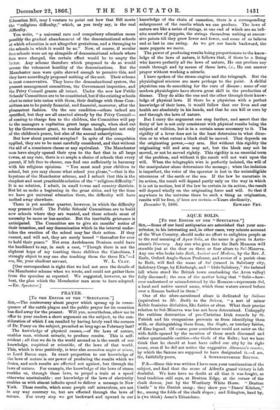AQUA SOLIS.
[To THE EDITOR OF THE " SPECTATOR."]
Sin,—Some of our local antiquaries are astonished that your con- tributor, in his interesting and, in other cases, very minute account of the West Country, should make no effort to enlighten people as
to the real meaning of Agux Solis, as the name is given in Auto- ninus's Itinerary. Any one who goes into the Bath Museum will
stumble just at the door on three or four altars to Sul-Minerva.
Any one who looks into Bath, Ancient and Modern, by the Rev. J. Earle, Oxford Anglo-Saxon Professor, and rector of a parish close to Bath, will find the name of Sul (traced in Salisbury city, Salisbury Crags, by Edinburgh, and " little Salisbury," the isolated hill where stood the British town overlooking the Avon valley) fully discussed ; the sum of the matter being that " Solis—how- ever understood or misunderstood by the Romans—represents Sul, a local and native sacred name, which these waters owned before ever a Roman bathed in them."
One of the afore-mentioned altars is dedicated by Sulinus (equivalent to Mr. Bath) to the &dews, " a sort of minor
Keltic feminine divinities, like fairies or elves. What their precise relation to Sul-Minerva was has not been determined. Unhappily the ruthless destruction of pre-Christian Irish records by St.
Patrick and his companions prevents us from identifying them with, or distinguishing them from, the Sioghe, or tutelary fairies, of Erse legend. Of course your contributor could not enter on the wide fields opened by the mention of those much discussed and rather questionable entities—the Gods of the Kelts ; but we here think that he should at least have called our city by its right name, even if he did not notice the suggestive Alcemann's ceaster, by which the Saxons are supposed to have designated it.—I am, P.S.—Since this was written I have seen your continuation of the subject, and find that the scene of Alfred's grand victory is left doubtful. We here have no doubt at all that it was fought, as local tradition still says, at Bretton Edge, at the corner of the chalk downs, just by the Westbury White Horse. " Bretton Castle" is the Danish camp; they show you "Danes' Kitchen," &c., among the folds of the chalk slopes ; and Ellington, hard by, is (we think) Asser's Ethandune.


































 Previous page
Previous page